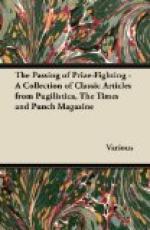Well, never mind. The work is done;
People who do not need it—
The wit, the fire, the force, the fun,
The pathos—let them simply
shun
This frightful book, shout “Shame!”
and run;
Nobody’s forced
to read it.
EVOE.
* * * * *
[Illustration: Dentist (after preliminary inspection). “EXTRAORDINARY THING—THERE’S ONE OF YOUR TEETH ONLY HALF STOPPED.”
Patient. “AH, THAT WERE T’OOTHER DENTIST. T’ LAAD ’URT ME, SO AH GAVE ‘IM A GOOD LICK IN T’ JAW.”]
* * * * *
=NOMEN, OMEN.=
(By our Medical Correspondent.)
No one who is interested in the possibilities of psycho-therapy can view without serious misgiving recent tendencies in artistic nomenclature. Some of us are old enough to remember when the trend was in the direction of Italianisation; when FOLEY became SIGNOR FOLI; CAMPBELL, CAMPOBELLO, and an American from Brooklyn was transformed into BROCCOLINI. The vogue of alien aliases has passed, but it may return, and it is to guard against the formidable and deleterious results of its recrudescence that the following suggestions, are propounded, not merely in the interests of Gongorism or of an intensive cultivation of syncretic euphuism, but in accordance with the most approved conclusions of psycho-analytic research.
It may be urged—and the objection is natural—that there can be little danger of a relapse in view of the heroic and patriotic adhesion of some of our most distinguished artists to their homely patronymics. No doubt the noble example of CLARA BUTT and CARRIE TUBB is fortifying and reassuring, and there are also clamant proofs that denationalisation is no passport to eminence. But it would be foolish to overlook the existence of powerful influences operating in an antipodal direction. I confess to a feeling approaching to dismay when I study the advertisement columns of the daily papers and note the recurrence, in the announcements of impending concerts, of names of a strangely outlandish and exotic form. In a single issue I have encountered KRISH, ARRAU, KOUNS and DINH GILLY. The Christian names of some of these eminent performers are equally momentous and perturbing, e.g., JASCHA, KOFZA and UTT.
My grounds for perturbation are not imaginary or based on the hallucinations of a hypersensitive mind. They are prompted and justified by the notorious facts, established by the leading psycho-analysts, that, just as mellifluous and melodious names exercise a mollifying influence on the activities of the sub-conscious self, so the possession or choice of strange or ferocious appellations incites the bearer, if I may be permitted to use so commonplace a term, to live up to his label.
It is therefore with all the force at my command that I entreat and implore singers, players and dancers to think, not once but twice or thrice, before they yield to the fascination of the unfamiliar and adopt artistic pseudonyms calculated to intensify the “urges” of their primitive instincts. It is not too much to say that a singer who deliberately assumes the name of Pongo, Og or Botuloffsky runs a serious risk, in virtue of the inherent magic of names, of developing qualities wholly unfitted for the atmosphere of a well-conducted concert-hall.




